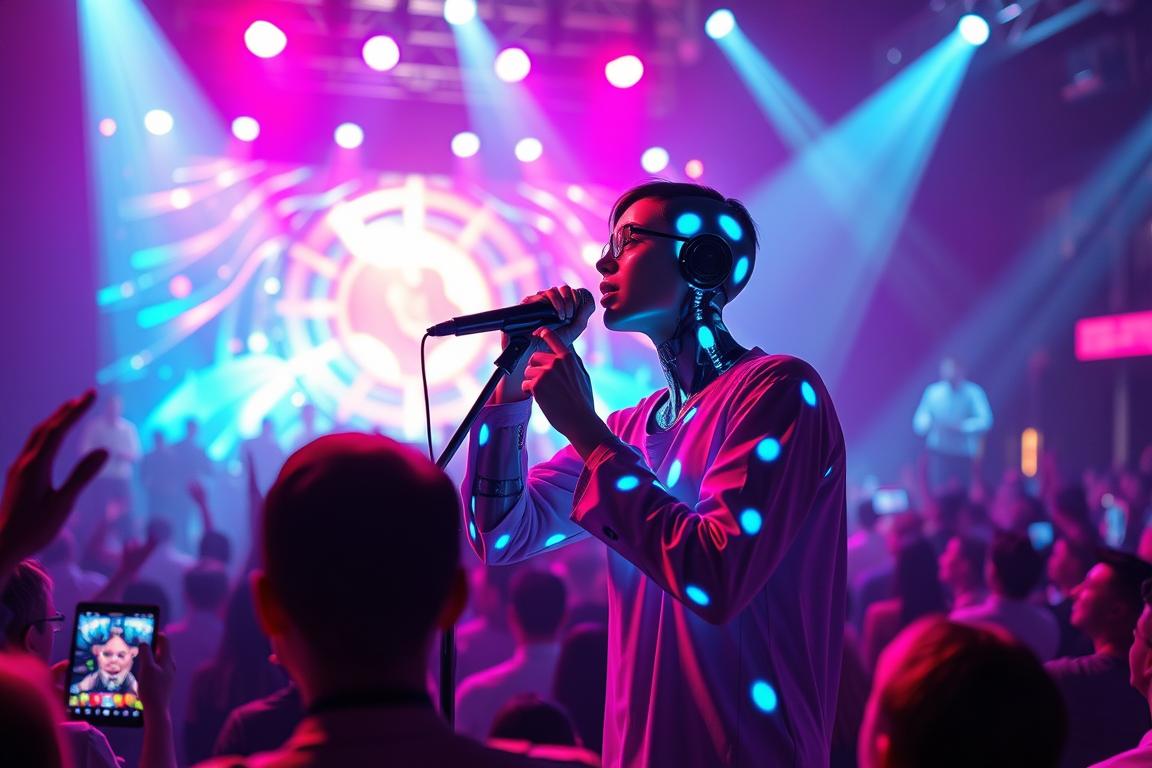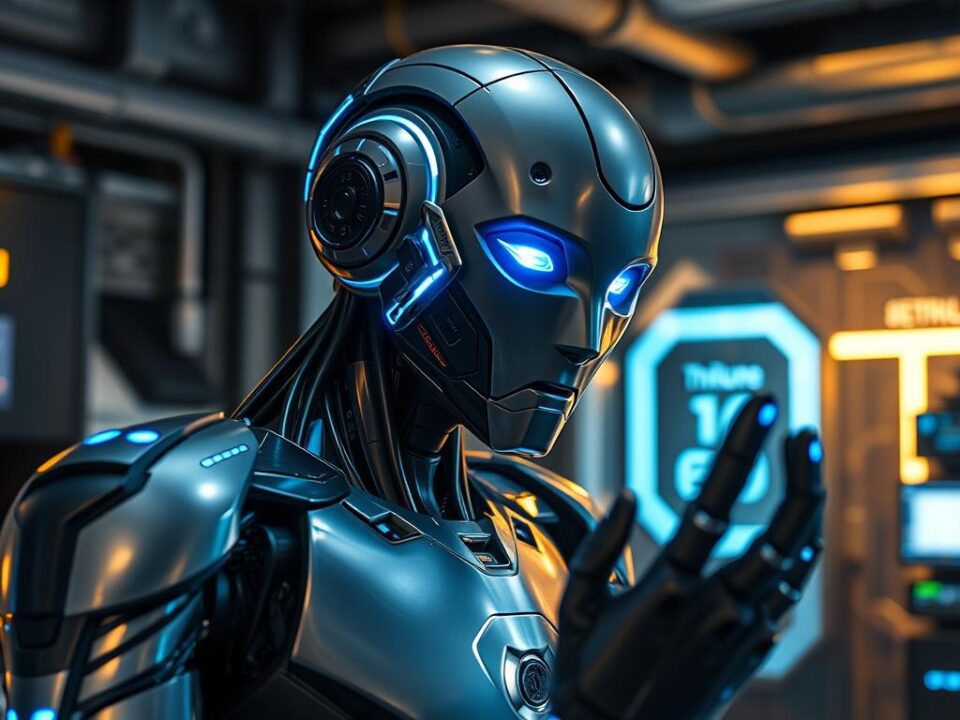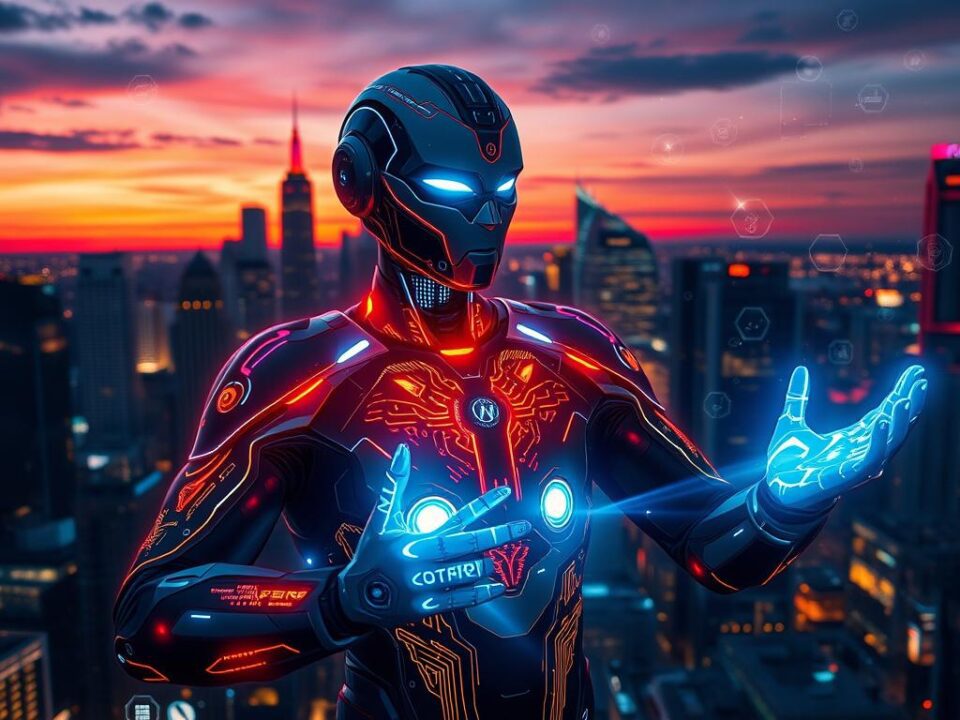Technology is changing how we enjoy music, with virtual concerts at the forefront. Platforms like Vox use advanced tech to connect artists with fans in new ways. With the rise of virtual reality, live music is getting a fresh makeover.
This article will explore the world of virtual concerts and AI singers. These experiences offer immersive settings and chances for fans to interact. Let’s dive into how AI virtual singers are changing the music scene.
What is an AI Virtual Singer?
AI virtual singers are a new frontier in music and technology. They use artificial intelligence to mimic human singing voices. This technology uses complex algorithms and machine learning to create realistic sounds.
Definition of AI Virtual Singers
AI virtual singers are software that can sing like humans. They use data from over 1000 celebrity voices. This allows for a wide range of singing styles and expressions.
Artists can explore new sounds and genres with these tools. It’s a way to expand their creative horizons.
How AI Technology Works in Music
AI technology in music analyzes many vocal performances. It trains on a large model to mimic real artists. This includes singing in different languages and dialects.
It understands the subtleties of language, making music more authentic. This opens up new possibilities for music production.
Benefits of Using AI Singers
AI singers offer many advantages in the music industry. They make music production cheaper and more accessible. Artists can create high-quality music without spending a lot.
These tools also encourage creativity. They allow humans and AI to work together. This leads to new and original musical ideas.
The Rise of AI in the Music Industry
AI has made big changes in the music world, changing how artists make and share music. The story of AI in music is interesting, starting with early tests in the mid-20th century. Pioneers like Xenakis and Hiller used math to make music, setting the stage for today’s tech in music.
The rise of virtual singers shows how AI has changed music making and listening. It has opened new doors in creativity and how we connect with music.
Historical Context of AI in Music
AI in music started with early experiments. In the 1980s, systems like David Cope’s ‘Emmy’ could make music in classical styles. By 2016, Sony’s Flow Machines created “Daddy’s Car,” the first pop song made by AI.
These steps show a steady move toward using tech for music. Advanced algorithms and learning machines have led to new ideas in music.
Popular Examples of AI Singers Today
Today, we see many AI singers that are very popular. Luo Tianyi is a virtual pop star in China, drawing big crowds. Tools like Amper Music and Jukin also help artists make music, making it easier and more creative.
As AI gets better, it brings new chances for music. It shows how human talent and AI can work together in amazing ways.
Vox: Pioneering AI Virtual Singing
Vox is a leader in AI music creation, changing how we make music. It uses advanced tech to make music production easier. Artists can be creative and work together easily, without dealing with big software.
Overview of Vox’s Technology
Vox’s interface is easy to use. It has a big library of singing voices. This lets creators find the perfect voice for their music.
Vox makes creating music fast and high-quality. It saves time, so artists can focus on their music.
Key Features of Vox
- Customizable Vocal Characteristics: Artists can change pitch, tempo, and timbre. This helps them create the sound they want.
- Commercial Rights: The music made here can be sold. This helps artists make money from their work.
- User-Friendly Interface: Both new and experienced musicians can use Vox easily. It’s designed to be simple.
- Harmony Generation: Vox can create harmonies. This adds depth to music, making it richer.
Success Stories from Vox Users
Many artists have found success with Vox. They say it has changed their music-making for the better. Independent artists can make great music fast, which helps them stand out.
Vox lets artists spend more time on creativity. It’s a key tool for today’s musicians.
How AI Virtual Singers Create Music
AI has changed how we make music. It mixes tech with talent, creating something new. AI singers don’t just make sounds; they improve them with smart programs. Musicians use AI to make music that fits their dreams, showing how humans and AI work together.
The Creative Process Behind AI Singing
AI virtual singers use smart algorithms to turn melodies and lyrics into songs. This tech makes music production flexible. AI looks at lots of songs to suggest new chord progressions and styles.
This shows how AI singers can change traditional songwriting. It opens up new ways to make music.
Combining Human and Machine Creativity
Humans and AI work together in music today. Artists guide AI to make sure the music is true to their vision. This teamwork leads to:
- Quick changes to vocals for specific songs.
- Customizing vocals like pitch and tone instantly.
- Creating melodies faster, saving time in the studio.
This teamwork lets musicians be more creative. It brings new ideas to music, making it more exciting.
The Experience of Attending Virtual Concerts
Virtual concerts have changed how we connect with music and artists. Streaming technology lets us watch from anywhere. It brings the excitement of live shows without the need to be there in person.
How Virtual Concerts Work
Virtual concerts use streaming tech to bring live shows to fans worldwide. They offer interactive features and augmented reality to make it feel like you’re there. As tech gets better, so will the experience of watching these concerts.
Immersive Elements of AI Concerts
AI concerts bring new creativity and interaction to shows. They use AI to change the show based on what the audience likes. This makes the experience unique and personal.
Companies like Industrial Light & Magic are pushing the limits of what’s possible. Fans can look forward to even more amazing shows.
The Audience Experience
Watching virtual concerts can be very rewarding. For example, Ariana Grande’s Fortnite concert drew over 78 million viewers. People feel more connected than they do at regular concerts.
Virtual concerts aim to capture the spirit of live music. They create lasting connections with fans. As tech improves, so will the thrill of these concerts.
Advantages of AI Virtual Concerts
AI virtual concerts offer many benefits for fans and artists. They make concerts more affordable and accessible. They also focus on personalizing the experience for everyone.
Cost-Effectiveness of Virtual Concerts
Virtual concerts save a lot of money. They don’t need big venues, so costs like staging and security drop. This means artists can sell tickets for less, making concerts more accessible to fans.
Accessibility for Global Audiences
AI concerts open up live music to the world. Fans everywhere can join in, without being held back by distance. This makes it easier for people from all over to enjoy their favorite artists.
Customization and Personalization
AI concerts also offer a chance for fans to customize their experience. They can interact with the show in real-time, making it special for them. This mix of technology and audience feedback creates a unique connection to the music.
Challenges Facing AI Virtual Singers
Artificial intelligence is changing the music world, but it brings big challenges. These include questions about who owns and created AI-made songs. People wonder if AI can truly capture the human touch needed in music.
The mix of new ideas and old traditions is tricky for artists and fans. It makes the music scene complex and interesting.
Ethical Considerations in AI Music
Using AI in music raises big ethical questions. Many worry about jobs and fair pay for musicians in an AI-driven world. Music is key for our mental and physical health, making us question AI-made songs.
Some people are willing to pay more for music made by humans. They value the realness it offers over AI’s ease. The debate on AI music ethics is important, sparking talks on creativity.
Quality Control and Authenticity Issues
Keeping AI music quality high is crucial for winning over listeners. Tools like Lalals and Musicfy offer new ideas but often fall short. They produce vocals that sound robotic and don’t always get the notes right.
Platforms like Dreamtonics Synthi V have been criticized for their unnatural vocals. Users often prefer human singers for their emotional depth. Fixing these quality issues is key to building trust in AI music.
Future Trends in AI Virtual Singing
The world of AI singers is set to change music forever. New tech in live events is making things possible we never thought of. The AI music market is growing fast, expected to hit $6.80 billion by 2026.
This growth shows how much people want AI to make music better. It’s all about giving fans new ways to enjoy music.
Predicting the Evolution of AI Singers
Today, music creation and performance are getting a boost from AI. The market for making voices sound better is growing fast. It’s set to reach USD 229 million in 2022 and keep growing.
Artists using tech like Auto-Tune are seeing more fans and better sales. This shows AI can really help in the music world.
Emerging Technologies in Live Events
New tech in live events will change how we experience music. AI tools will make making music easier and help singers get better. For example, AI can check if a singer’s pitch is right.
AI can also make music sound more natural. It can even help with writing songs by learning from other artists.
AI and virtual reality will soon bring concerts to life in new ways. Artists and event planners will use these tools to create unforgettable experiences. The future of AI in music looks bright, full of new sounds and ways to connect with fans.
Engaging with Vox and AI Music
Engaging with Vox music offers a unique immersive experience for fans of innovative sound. Users can easily join virtual concerts hosted by Vox, where cutting-edge AI performers take the stage. Through dedicated platforms and applications, attendees can connect in real-time, enhancing their concert experience.
How to Join a Virtual Concert
Joining virtual concerts has never been simpler. Follow these steps to dive into the world of AI music:
- Choose a platform that hosts Vox music events.
- Create an account or log in to access the concert information.
- Purchase tickets if applicable; rates vary for members and non-members.
- Familiarize yourself with the event schedule and features.
- Prepare your device with a stable internet connection for the best viewing experience.
Interacting with AI Singers During Shows
One of the most thrilling aspects of virtual concerts is interacting with AI performers live. These interactions can include:
- Voting for setlists or song choices during the performance.
- Using on-screen chat features to express thoughts or send compliments to AI singers.
- Participating in polls that enhance the concert experience in real-time.
This level of engagement not only fosters a connection between the audience and the performers but also elevates the overall enjoyment of the event.
The Role of Fans in AI Music
Fans play a big part in the world of AI music. They help build a community around AI singers. This community is full of creativity and collaboration. Fans use social media and forums to talk about their favorite virtual singers.
They share their experiences and work on projects together. This creates a sense of belonging among fans.
Community Building Around AI Singers
The community around AI singers is key to the AI music world. Fans get involved in many ways:
- Engagement on Social Media: Twitter and Instagram are where fans share music, videos, and art.
- Discussion Forums: Special forums for AI music let fans share thoughts and connect with others.
- Collaboration: Fans often work together to create new content, bringing fresh ideas to the table.
Fan Contributions to AI Music Productions
Fans also contribute to music production in AI music. They help shape the creative process and results by:
- Providing Feedback: Fans give valuable feedback that helps musicians and AI tools improve their work.
- Participating in Collaborations: Musicians sometimes ask fans to join in, adding their creativity to the final product.
- Sharing Discoveries: Fans spread the word about new AI tools and music, helping the community grow.
Conclusion: The Future of Music with AI
The music world is on the verge of a big change. AI technologies are making concerts and music creation different. Virtual concerts with AI singers give fans a unique and personal experience.
This change makes live music more accessible. It also opens up new ways for artists and fans to explore AI in music.
Summarizing the Impact of AI on Concert Experiences
AI tools like OpenAI’s MuseNet and AIVA help artists create music faster. This leads to better concert experiences. These technologies add live visuals and adjust sounds in real-time.
This makes concerts more than just shows. They become immersive events. The future of music with AI looks bright, with technology and artistry coming together in new ways.
Encouraging Exploration of AI in Music
AI in music opens up many possibilities. It helps create personalized playlists and gives independent artists a chance to shine. AI’s impact is felt in every part of the music world.
As artists use these tools more, their music and connection with fans will grow. This exploration of AI in music promises exciting new directions.







